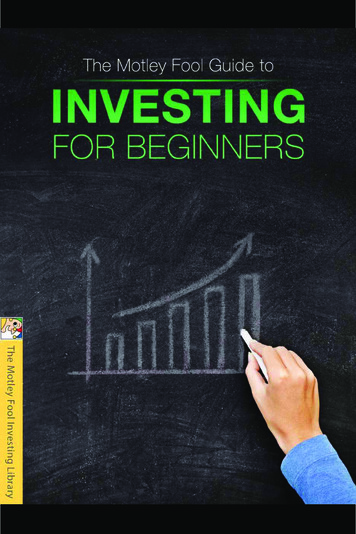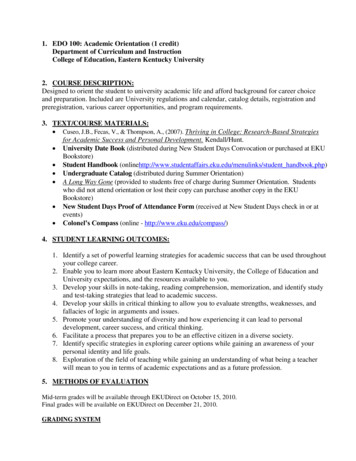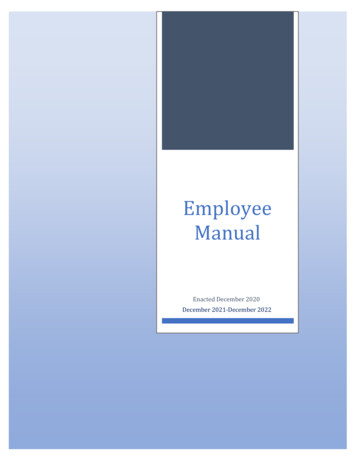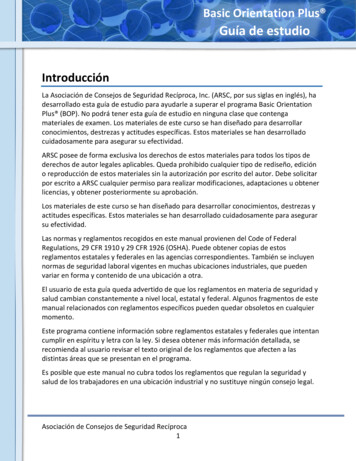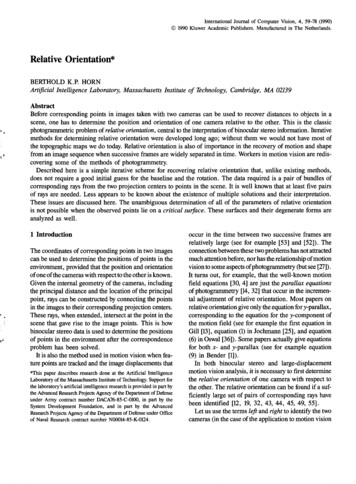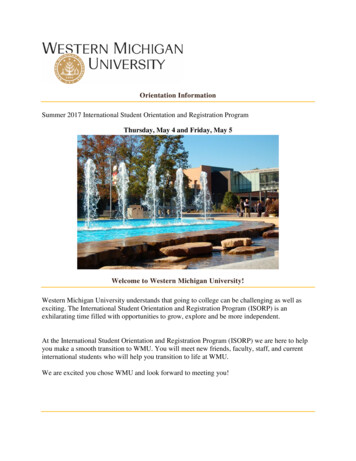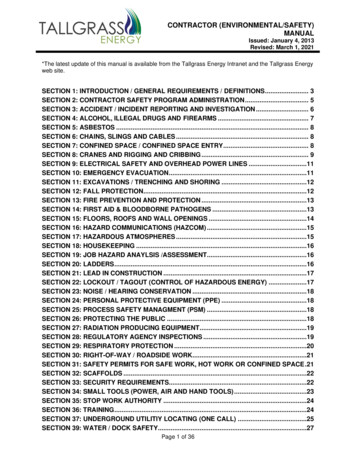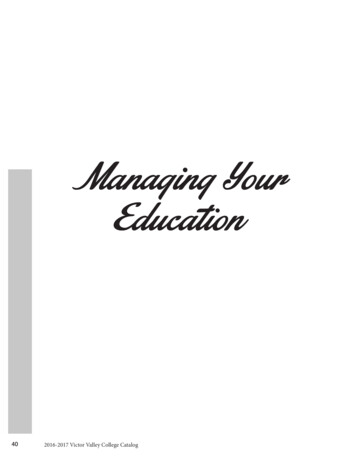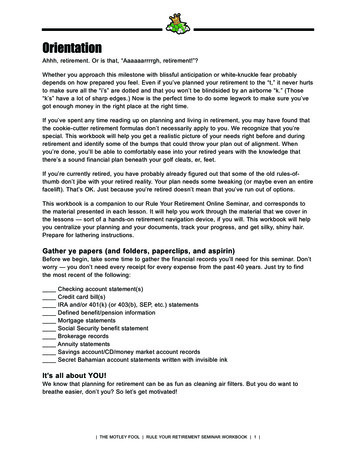
Transcription
OrientationAhhh, retirement. Or is that, “Aaaaaarrrrgh, retirement!”?Whether you approach this milestone with blissful anticipation or white-knuckle fear probablydepends on how prepared you feel. Even if you’ve planned your retirement to the “t,” it never hurtsto make sure all the “i’s” are dotted and that you won’t be blindsided by an airborne “k.” (Those“k’s” have a lot of sharp edges.) Now is the perfect time to do some legwork to make sure you’vegot enough money in the right place at the right time.If you’ve spent any time reading up on planning and living in retirement, you may have found thatthe cookie-cutter retirement formulas don’t necessarily apply to you. We recognize that you’respecial. This workbook will help you get a realistic picture of your needs right before and duringretirement and identify some of the bumps that could throw your plan out of alignment. Whenyou’re done, you’ll be able to comfortably ease into your retired years with the knowledge thatthere’s a sound financial plan beneath your golf cleats, er, feet.If you’re currently retired, you have probably already figured out that some of the old rules-ofthumb don’t jibe with your retired reality. Your plan needs some tweaking (or maybe even an entirefacelift). That’s OK. Just because you’re retired doesn’t mean that you’ve run out of options.This workbook is a companion to our Rule Your Retirement Online Seminar, and corresponds tothe material presented in each lesson. It will help you work through the material that we cover inthe lessons — sort of a hands-on retirement navigation device, if you will. This workbook will helpyou centralize your planning and your documents, track your progress, and get silky, shiny hair.Prepare for lathering instructions.Gather ye papers (and folders, paperclips, and aspirin)Before we begin, take some time to gather the financial records you’ll need for this seminar. Don’tworry — you don’t need every receipt for every expense from the past 40 years. Just try to findthe most recent of the following:Checking account statement(s)Credit card bill(s)IRA and/or 401(k) (or 403(b), SEP, etc.) statementsDefined benefit/pension informationMortgage statementsSocial Security benefit statementBrokerage recordsAnnuity statementsSavings account/CD/money market account recordsSecret Bahamian account statements written with invisible inkIt’s all about YOU!We know that planning for retirement can be as fun as cleaning air filters. But you do want tobreathe easier, don’t you? So let’s get motivated! THE MOTLEY FOOL RULE YOUR RETIREMENT SEMINAR WORKBOOK 1
The chart below is an outline of the seminar lessons. You will also notice that the far-right columnis blank, except for an intriguing heading: “Reward.” Consider what would help you get through theplanning process. Pick a reward that will motivate you to do so — perhaps a modest meal out, acompact disk, a book, a massage, or a nose ring. Photocopy this section and hang it on yourrefrigerator to keep you motivated (if you don’t mind the cleaning lady tracking your progress, too).Rule Your Retirement LessonExerciseLesson 1: What Does It Cost to Be You?You’ll start with a littleretirement self-exploration.Then, break out thecheckbook and bankstatements — it’s timeto play “Let’s Make a Budget!”Lesson 2: What Will Retirement Cost?You’ll determine whichexpenses will disappear,as well as the new expensesthat you’ll incur (summercamps for gramps, anyone?).Lesson 3: Do You Have Enough to Retire?You’ll take an inventory ofall you owe and own, andcompare your assets tothe list of investmentssuitable for retirees.Lesson 4: Make Your Money LastUsing various calculations,you’ll determine if you haveenough to live the retirementyou want. Conversely, you’llfigure a safe withdrawal ratefrom your assets.Lesson 5: Augmenting Your Nest EggYou’ll learn various ways tomake up for retirementshortfalls, or just putyourself on better footing.Lesson 6: All in the FamilyYou’ll record the locationsof all your important papers,and begin consideringestate-planning issues.Lesson 7: Life HappensYou’ll hear from seasonedretirees who will revealwhat they wish they’dknown before they startedtheir lives of leisure. THE MOTLEY FOOL RULE YOUR RETIREMENT SEMINAR WORKBOOK 2 Reward
Lesson 1: What Does It Cost to Be You?Before we can figure out how you’ll get to where you want to go, we have to see where you are.In other words, we’re going to take stock of your current situation. But before we begin crunchingnumbers and doing a cash-flow analysis (don’t worry — it’s not that bad), let’s get in touch withyour “inner-pensioner.”Retirement Attitude TestWhat are your initial thoughts, preconceived notions, and expected hurdles when it comes toretirement planning? How much planning have you already done? Take the following quiz to getyour mental balls rolling.1) At what age do you think you’ll retire? (If you’re already retired, this should be easy. To besporting, you could guess an age at which you’ll expire, but it’s much more grim.)2) How much savings do you think you’ll need to have accumulated before you can comfortablyretire? If you’re already retired, how much more — or less — do you need to live on? 3) How far along are you to reaching that amount? (Circle ��-70%—-80%—-90%—-100%4) How much will you rely on Social Security to fund your retirement costs? (Circle one.)A. More than 50% of my retirement income will come from Social Security.B. Anywhere from one-fifth to a third of my retirement income will come from Social Security.C. It’ll be a nice bonus, but I will (or do) have other sources I can rely on.D. I’ll use my benefit to take a trip each year, until the Social Security system implodes, whichwill happen any day now.5) How much do you receive — or expect to receive — from Social Security each month? THE MOTLEY FOOL RULE YOUR RETIREMENT SEMINAR WORKBOOK 3
6) What are your major obstacles to retirement planning?I don’t want to sit down and do the planning.YesNoI’m afraid that I’m not as prepared as I think I should be.YesNoI don’t have the time to learn about everything.YesNoIt’s so boring; I’d rather clean the bathroom.YesNoOthers:7) What will/do you enjoy most about retirement? (Circle one.)A. The freedom to travel.B. Time for recreational activities such as golf, tennis, reading, etc.C. No more job!D. Working with charitable organizations.8) What will/do you fear the most about retirement? (Circle one.)A. I’ll outlive my money.B. I’ll spend a large portion of my retirement in poor health.C. I won’t know what to do with myself.D. I hate golf and shuffleboard.9) How much retirement planning have you done up to this point? (Circle one.)A. Practically none — I’ve heard about this new program called “Social Security,” and I’mcurious how it works.B. A little — I’ve socked away money for decades, but I don’t know where it will get me.C. A fair amount — but my plan could use some re-evaluation.D. All I need to — I’m just taking this seminar to be smug on the discussion boards.10) I understand how I will cover my medical costs, and how I should account for Medicare in myretirement plans. (Circle one.)TrueFalse THE MOTLEY FOOL RULE YOUR RETIREMENT SEMINAR WORKBOOK 4
As you could probably guess, this quiz wasn’t designed to test your IQ, nor to see how much youknow about retirement. Rather, we hope it gave you an idea of where you are in the retirementplanning process. If you’ve already left the workaday world, perhaps this exercise pointed outsome areas that may need more attention. Regardless of where you are along the road toretirement, though, you’ll be on much firmer ground, and have a better sense of direction, onceyou’ve completed this seminar and workbook.Your inflow and outflowThe foundation of retirement planning is knowing if you’ll be able to cover your expenses year inand year out. So let’s start by determining what those expenses are now.1. Gather the statements of any account from which you pay bills. If you don’t have thestatements handy, you may be able to access them via the Internet. It may help to have yourcheckbook available, too, if you keep accurate records in the registry.2. Using your records, complete the following cash-flow statement.3. We’re looking for annual numbers, but we don’t suggest you review all of your records fromthe past 12 months. You can get estimates for the past six months, then multiply thoseamounts by two. Or estimate the inflow and outflow over a three-month period, then multiplythose figures by four to arrive at an annual number.Later in the seminar, we’ll project what those expenses will be (so just fill in the first column for now). THE MOTLEY FOOL RULE YOUR RETIREMENT SEMINAR WORKBOOK 5
ANNUAL CASH FLOW STATEMENTTodayEarlyRetirementMiddleRetirementAges -Ages -LateRetirementAges -INCOMESalary/wages rship incomePension distributionsSocial Security benefitsRetirement account distributionsAnnuity distributionsTrust distributionsAlimony/child supportSale of assetsGiftsTax refundsOther incomeTOTAL INCOMEEXPENSESRetirement plan contributionsMisc. saving and investingTaxes (federal, state, local)Social Security taxes (FICA)Groceries THE MOTLEY FOOL RULE YOUR RETIREMENT SEMINAR WORKBOOK 6
TodayEarlyRetirementMiddleRetirementAges -Ages -EXPENSES neOil/gasTrash removalMaintenanceInsuranceReal estate taxesImprovementsChildren:ChildcareClothes and extracurricularsEducation (tuition, college savings)Child supportAutomobile:Loan /parkingProfessional development/duesClothing/uniforms/dry cleaning THE MOTLEY FOOL RULE YOUR RETIREMENT SEMINAR WORKBOOK 7 LateRetirementAges -
TodayEarlyRetirementMiddleRetirementAges -Ages -LateRetirementAges -Medical care and insurance:Health care premiumPhysician and medical careMedicationMedicare premium (Part B)Supplemental insuranceLife insuranceDisability insuranceLong-term careFun stuffHobbiesEntertainmentTravelDining out/take-home foodLaundry and cleaningClothingFurniturePersonal careGiftsDonations to church and charityCredit card paymentsStudent loan paymentsOther loan paymentsAlimonyOther expensesTOTAL EXPENSES CASH SURPLUS (DEFICIT) THE MOTLEY FOOL RULE YOUR RETIREMENT SEMINAR WORKBOOK 8
Lesson 2: How Much Will Retirement Cost?In Lesson 1, you completed the cash-flow statement for today. Now, we’re going to estimate thecosts of tomorrow and fill out the other columns of the cash-flow statement!Let’s start by doing a little daydreaming about your golden years. To figure out how much moneyyou’ll need to live a comfortable retirement we first need to establish what you’ll be doing with allof your new free time. Where do you want to live? What do you want to do with your free time?Funny, the next few worksheets have to do with those very topics. (Then we slip in some of theless exciting but equally important expected expenses — the costs of insurance and medicalcare.)If you’re already retired, this is a good time to examine your expenses and project the costs intothe future. For instance, expenses such as hobbies and activities are negotiable — meaning that ifneed be, you can funnel some of the money you have going into these to cover shortfalls in otherareas of your plan.Where do you want to live?Think about the pluses and minuses of renting versus owning, and jot them down here.For instance, weigh the hassles of a home (a mortgage, taxes) against pride of ownership.Which matters more to you?RentingOwningAdvantagesDisadvantages THE MOTLEY FOOL RULE YOUR RETIREMENT SEMINAR WORKBOOK 9
Do you want to live close to a city so you can take in the opera every week? Or is this yourchance to finally retire to that log cabin in Vermont? Each will have different costs. Do you want tolive close to family and friends, or seek enlightenment in Tibet?LocationAverageHousing CostsAverageTax RatesProximity of Location to Loved OnesDistance fromfriends andfamilyHow often willyou travelback and forth THE MOTLEY FOOL RULE YOUR RETIREMENT SEMINAR WORKBOOK 10 Average costof trip
What do you want to do?Determine how you are going to spend your retirement “fun money” — e.g., learning to pilot a helicopteror forge important Impressionist works of art. If you have no idea how much pilot school or art forgeryclasses will cost, do a little research. There’s also space for you to project your activity costs. After all,you might want to move on to hot air balloons and sculpture forgery some day.For those already living in retirement, hone in on the actual costs of your hobbies for a more accuratepicture of your expenses, and attempt to anticipate future expenses.Early RetirementEstimated Length of Stage:Hobbies, entertainment, and travelLength of timeEstimated annualcost of the activityTOTAL Early:Middle RetirementEstimated Length of Stage:Hobbies, entertainment, and travelLength of timeEstimated annualcost of the activityTOTAL Middle:Late RetirementEstimated Length of Stage:Hobbies, entertainment, and travelLength of timeEstimated annual costover life of the activityTOTAL Late: THE MOTLEY FOOL RULE YOUR RETIREMENT SEMINAR WORKBOOK 11
Are you covered?Now here’s the really fun part — insurance! Okay, so it’s not Disney World. But as we discussed in thelesson, adequate insurance helps you transfer “risk” to others. Meaning, should some catastrophic — oreven minor — event occur, your retirement income will remain intact as long as you have adequateinsurance to cover the boo-boo.Below take inventory of how you’re insured now and what you’ll need in retirement. What policies do youcurrently hold and what are they worth?KIND OF POLICYPOLICYNUMBERPOLICYHELDTHROUGHEMPLOYER?POLICY AMOUNT ORBENEFITS COVERED(For medical insurance,indicate what kind of medicalpolicy and its benefits.For others, list mainbenefits that are coveredin the plan.)LIFE INSURANCEMEDICAL INSURANCESUPPLEMENTAL MEDICALINSURANCEMEDICARELONG-TERM CAREINSURANCE THE MOTLEY FOOL RULE YOUR RETIREMENT SEMINAR WORKBOOK 12 BENEFICIARIES(if applicable)
KIND OF POLICYPOLICYNUMBERPOLICYHELDTHROUGHEMPLOYER?POLICY AMOUNT ORBENEFITS COVERED(For medical insurance,indicate what kind of medicalpolicy and its benefits.For others, list mainbenefits that are coveredin the plan.)DENTAL INSURANCEAUTO INSURANCEHOMEOWNERS’INSURANCERENTERS’ INSURANCEUMBRELLA LIABILITYINSURANCEDISABILITY INSURANCE THE MOTLEY FOOL RULE YOUR RETIREMENT SEMINAR WORKBOOK 13 BENEFICIARIES(if applicable)
Insurance shoppingIf you will need to purchase a new policy, more coverage, or you’d just like to make sure yourcurrent policies are competitively priced, use the table below to aggregate your information.PROVIDER(name and contact information)POLICY PARTICULARS(coverage, co-pay, limits,deductibles, etc.)PREMIUM(make sure to indicate monthly,semiannually, or annually)Completing the cash-flow statementUsing the information from this lesson, complete the remainder of your annual cash-flow statement.(Make sure you use a pencil — you’ll be fiddling with these numbers later!) Compared to the expensesin the “Today” column, you’ll find that the expenses in the “Early,” “Middle,” and “Late” columns willeither: Be the same: Many of your expense won’t be affected by your retirement. Be significantly less: Be sure to account for all the costs that will decrease or disappear once you retire. Be significantly more: Enter the figures you estimated in this lesson for a change in livingarrangements, additional hobbies/travel, and increased insurance/medical costs to your cash-flowstatement.Voila! Now you know how much your retirement will cost. Now, let’s see if you can afford it! THE MOTLEY FOOL RULE YOUR RETIREMENT SEMINAR WORKBOOK 14
Lesson 3: Do You Have Enough to Retire?From the previous lessons, you have a better handle on your current cost-of-living and yourannual expenses in retirement.Now, on to figuring out your net worth, which includes all of your personal savings, pensions,investments, sources of income, and that Cabbage Patch Doll collection. After you complete thisworkbook lesson, you’ll have a clear answer to the age-old question “Why would some youngthang want to run off with me?”Kidding. But the results will tell you where you stand as you ease into retirement or continue downthe path you’ve already started.Let’s look a little more in-depth at where your retirement income will come from. As you learned inthis lesson, there are five sources of retirement income: Social Security Employer-provided pensions Personal savings (taxable accounts, 401(k)/403(b)/457 plans, IRAs, etc.) Work (wages) Other (inheritances, home equity, collections, etc).Get ready — it’s tally time!Sources of Income1. Social SecurityEnter your current Social Security benefit (or estimated future benefit, based on informationsent to you by the SSA). If you don’t have a copy of your statement, estimate that incomeusing the calculator at http://www.ssa.gov/planners/calculators.htm. Will your Social Security income pass to a survivor? (Circle one.)2. Employer-Provided PensionsDo you have an employer-provided pension? (Circle one.)YesNoYesNoWhat is your vesting period?yearsIs it dependent on the age you retire? (Circle one.)YesNoWhat will be your projected annual income? Will your employer-provided pension plan keeppace with inflation? (Circle one.)YesNoWill your pension income pass to a survivor? (Circle one.)YesNoBeneficiaries listed for your pension: THE MOTLEY FOOL RULE YOUR RETIREMENT SEMINAR WORKBOOK 15
3. Personal Savings/Investment VehiclesComplete the following charts with information about the assets in your retirement accountsand non-retirement accounts.ASSETS IN RETIREMENT ACCOUNTSAccount(IRA, 401(k), 403(b), 457, etc.)CASH & EQUIVALENTSBONDSAssetCurrent value ( )Examples: money markets,CDs, stable value accountsExamples: government securities,mortgage-backed securities,municipal bonds, corporate bonds,or mutual funds that invest in bonds THE MOTLEY FOOL RULE YOUR RETIREMENT SEMINAR WORKBOOK 16 Projected return(%)
ASSETS IN RETIREMENT ACCOUNTS (cont)Account(IRA, 401(k), 403(b), 457, etc.)AssetSTOCKSExamples: individual stocks,dividend reinvestment programs,equity mutual funds, REITsLIFE INSURANCE CASH VALUEExamples: whole life policy,universal life policy,variable life policyCurrent value ( )TOTAL VALUE OFALL RETIREMENT ACCOUNTS: THE MOTLEY FOOL RULE YOUR RETIREMENT SEMINAR WORKBOOK 17 Projected return(%)
ASSETS IN NON-RETIREMENT ACCOUNTSAccount (bank account,brokerage account,mutual fund account, etc.)AssetCASH & EQUIVALENTSExamples: savings accounts,checking accounts,money markets, CDsBONDSExamples: government securities,securities, municipal bonds,corporate bonds, bond mutual fundsSTOCKSREITsExamples: individual stocks,dividend reinvestment plans,equity mutual funds,Current value ( )TOTAL VALUE OFALL ACCOUNTS: THE MOTLEY FOOL RULE YOUR RETIREMENT SEMINAR WORKBOOK 18 Projected return(%)
4. Work (wages)Do you plan to work in retirement? (Circle one.)YesNoIf so, why do you want to work in retirement? (Check all that apply.)For pleasureShare your productivity with othersFill your hoursMonetary necessityGlutton for punishmentOtherHow many hours do you expect to work per week?hoursWould you like to work for yourself? (Circle one.)YesWhat is your projected annual income? NoList some possible jobs you might be interested in after retirement:1.2.3.4.5.6.7.Retirement Seminar Instructor5. OtherAs discussed in this lesson, it’s best to ignore gifts or inheritances as a source of income inretirement. But, if you want to, make a list of “other” sources of income you plan to rely on(your button collection, Mickey Mantle rookie card, real estate, etc.). THE MOTLEY FOOL RULE YOUR RETIREMENT SEMINAR WORKBOOK 19
OTHER ASSETSKind of savings/investmentREAL ESTATEDetailsCurrent value ( )Examples: rental income,undeveloped land, partnershipsBUSINESSOWNERSHIP/INTERESTPERSONAL ASSETSExamples: Home, cars, jewelry,collections, antiquesTOTAL VALUE OFOTHER ASSETS THE MOTLEY FOOL RULE YOUR RETIREMENT SEMINAR WORKBOOK 20 Projected returnon Investment(%)
Lesson 4: Make Your Money LastIn Lesson 2 you calculated how much you’re going to spend on an annual basis in retirement. InLesson 3 you figured out how much income you can expect in retirement from various sources,and the total value of your retirement assets. Now it’s time to put it all together and see if you canafford the retirement you’ve envisioned.Are you a risqué retiree?No, we’re not going to ask about that time you sent away for the brochure on the “Swinging SilverHaired Campground.” But we will ask you about how much risk you’re willing to take with yourwithdrawals from retirement savings.Based on historical returns and inflation, the studies on withdrawal rates reveal that you wouldprobably be safe if your first withdrawal from your retirement investments is between 4% to 6% ofthe portfolio’s value. Of course, that’s a rule-of-thumb. Your withdrawal rate will depend largely onyour life expectancy, your portfolio allocation, your other sources of income, and — we must admit— luck.You’ve got a few choices to make as you’re deciding on a safe withdrawal rate: You can adjust the amount each year for inflation. You can take a fixed percentage of your portfolio each year and allow your annual income tofluctuate. You can remain relatively conservative in withdrawal rates early in retirement and loosen up abit later if the economy indicates one can do so. You can prepare to cut expenses and withdrawals if necessary. On the other hand, get readyto party if your rates of return skyrocket!Which method is best for you? Your answers to the following questions might help you decide:1. What’s more important to you — making sure that your portfolio survives your annualdistributions over your entire life, or taking the largest distributions you reasonably canknowing that doing so increases your chances of running out of money? (Circle one.)Make it last a lifetimeShow me the money2. Do you see yourself taking more money in “good” investment years and cutting back yourincome in “bad” years? (Circle one.)Sure, I go with the flowI’m pretty set to my planned budgetI’m not too sure THE MOTLEY FOOL RULE YOUR RETIREMENT SEMINAR WORKBOOK 21
3. What are your other considerations? What are your risks for staying at a 100% “safe” level ofannual withdrawals? What’s the risk to your potential heirs?1)2)3)4)5)Running the numbersPerhaps the best way to decide on a withdrawal rate is through some old-fashioned numbercrunching (occasionally using some new-fangled technology). As we mentioned previously, thereare many ways to estimate whether your money will last. Before you begin trying some of themethods we suggested, keep these tips in mind: Try at least three methods explained in the lesson. You will probably get different results.Depending on your risk tolerance, choose the most conservative or most aggressive result —or the one in the middle. Record the variables you use in your calculations — but do so in pencil! You will probably bechanging a lot of your variables — e.g., your savings rate, your retirement income, yourwithdrawal rate — in order to see how it affects your plan.To help you record your variables, we’ve included a chart listing the inputs required for the Fool’sretirement calculator. However, you can use this sheet to keep track of the numbers you use forother methods as well. In fact, you might consider photocopying these charts so you can have acopy for each time you estimate your retirement savings and income.After the chart relating to the Fool’s retirement calculator, we have also included a simpler chartyou can use to record the essential inputs and results from other calculators, withdrawal rateestimates, etc. THE MOTLEY FOOL RULE YOUR RETIREMENT SEMINAR WORKBOOK 22
Personal InformationYour Pension or Defined Benefit PlanYouSpouseCurrent AgeMonthly PensionPaymentYearly Income YouSpouse Years You WillReceive PaymentsSelf-Employed?Age at RetirementyrsMonthly WagesAfter Retirement yrs For How Many YearsyrsyrsRate of Growth%% Rest of PaymentsAdjusted for Inflation Your Future, One-Time InvestmentsAmt.Invested BeforeRetirementAfterRetirementFederal Tax Rate%%State Tax Rate%%yrsFirst PaymentAdjusted for InflationAge at Which YouMight DieFunds Desired at DeathyrsRate ofReturnYears UntilInvestFirstInvestment %yrsSecondInvestment %yrsMonthly Savings (Not Tax-Deferred)CurrentBalanceMonthly Living Expenses When Retired(Do not adjust for inflation.) yrs yrs Remainder of retirementRateof l Security Benefits (monthly) for You for SpouseEstimated by CalculatorYesNoIgnoredYesNoAge You WillClaim BenefitsyrsAge Your Spouse WillClaim Benefitsyrs THE MOTLEY FOOL RULE YOUR RETIREMENT SEMINAR WORKBOOK 23 MonthlyInvest.Yearsto Start
Monthly Savings rn NowReturn atRetirementYour 401(k)%%YoursEmployer’sSpouse’s 401(k)%% Your SEP%%Spouse’s 401(k) Spouse’s SEP%%Your SEP Your SIMPLE%%Spouse’s SEP Spouse’s SIMPLE%%Your SIMPLE Your Keogh%%Spouse’sSIMPLESpouse’s Keogh%% Your IRA*%%Your Keogh Spouse’s IRA*%%Spouse’s Keogh Your Roth IRA*%%Your IRA* Spouse’s Roth IRA*%%Spouse’s IRA* Other%%Your Roth IRA* Your 401(k)Spouse’sRoth IRA* Other *For IRAs, please input a yearly, not monthly,contributed amount.ResultsWhat did the calculator tell you?1) You will be able to meet your retirement expenses and leave for others toinherit.OR2) You will not meet your retirement goals, but here are some suggestions for improving yoursituation: THE MOTLEY FOOL RULE YOUR RETIREMENT SEMINAR WORKBOOK 24
What the other calculations are sayingMETHODINPUTSRESULTSNOTES(Record details on previous pages)And the winner is After you’ve run a few numerical gauntlets, you should have a better idea if you’re on course toreach your retirement goals, or if you need to modify your plan. (If you did discover that you won’tbe able to meet your goals, don’t worry — the next lesson is all about solutions.)In the space provided below, record the conclusions you’ve reached based on the exercises in thislesson. As you do, consider the answers to the following questions: Are you on track to meet your goals? If not (and you’re not yet retired), how much more do you have to save each month? Can you afford to be more conservative with your investments, or do you need to be moreaggressive? What’s a reasonable rate of withdrawal?Oh no!Did you discover that your current assets won’t sustain you throughout retirement? As you werefiddling with the numbers, did you have to resort to significant risk-taking with your investments tomake it all add up? You needn’t worry. Go on to the next lesson where we talk about strategies toaugment your nest egg. THE MOTLEY FOOL RULE YOUR RETIREMENT SEMINAR WORKBOOK 25
Lesson 5: Augmenting Your Nest EggWe hope that the exercises in the previous lesson resulted in a hearty “Congratulations! You will be ableto pay your expenses throughout retirement and leave 177,063,227 for others to inherit.” Even withoutthe 177 million bequest, confirmation that you won’t run out of money is cause for celebration.However, it’s very possible that the results from Lesson 4’s exercises were cause for depression ratherthan elation. Did the online retirement calculator indicate you need to save an additional 10,000 permonth and work a decade after your death? Believe us — you’re not alone.So buck up, Fool. There are plenty of ways to stretch a nest egg without breaking it. Let’s start with thebiggest four:1. Increase your savings2. Decrease your in-retirement income needs3. Increase your investment returns4. Increase your incomeLet’s look at each, and come up with some specific solutions.1. Increase Your SavingsSocking away more money usually entails a shift in your financial priorities. You’ll have to decidefrom where the money will come, and then where you’ll put it. Here are some considerations: Look for ways to cut your current spending so you can funnel more money to your retirementaccounts. Review the “Today” column of your cash-flow statement for expenditures you canreduce or do without. Take advantage of the higher contribution limits to tax-advantaged retirement accounts forthose age 50 and older.Take action: Move your moneyFind ways to cut current spending and increase retirement saving. Use the “How much will my savingsbe worth?” calculator at http://www.fool.com/calcs/calculators.htm to estimate how much the extrasavings will add to your net egg.I’LL TAKEMONEY FROM.AND MOVE IT TO.AMOUNTPROJECTEDVALUE ATRETIREMENTCancel Cable TVRoth IRA 50/month 5,000 THE MOTLEY FOOL RULE YOUR RETIREMENT SEMINAR WORKBOOK 27
2. Decrease Your In-retirement Income NeedsPretty obvious, eh? The less you’ll need in retirement, the less you must have before you bidadieu to the rat race. Consider what is essential to making your retirement satisfying, and what is a luxury. Note that the less income you draw in retirement, the lower your tax bill will be.Take action: Re-evaluate your retirement prioritiesReview the in-retirement columns of your cash-flow statement for expenditures you can reduce ordo without.EXPENSETake just three cruises a year instead of fourAMOUNT SAVEDTHIS REDUCES MYREQUIRED ANNUALRETIREMENTINCOME TO. 2,000 58,000 THE MOTLEY FOOL RULE YOUR RETIREMENT SEMINAR WORKBOOK 28
3. Increase Your ReturnsIncreasing the money you earn from your investments doesn’t mean that you should start daytrading or put five years’ worth of retirement cash on red a
THE MOTLEY FOOL RULE YOUR RETIREMENT SEMINAR WORKBOOK 2 The chart below is an outline of the seminar les

